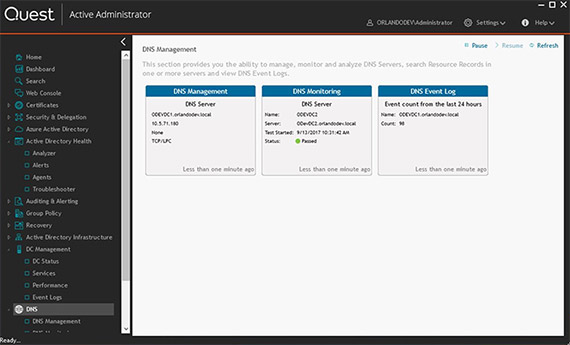-
Resources
- Forums
-
Active Administrator for DNS Management
Proactively manage, monitor and alert on DNS server health. When DNS services fail, your users are unable to access corporate applications and sites. Thus, ensuring DNS availability is critical to the daily operations of your organization. Unfortunately, native tools lack the ability to monitor and alert on the availability, health and critical changes to DNS.

Active Administrator for DNS Management, now included as a free module in Active Administrator and Active Administrator for AD Health, helps your organization ensure the availability of your DNS services by allowing you to create, edit and delete DNS records while providing alerts on critical DNS record changes or failures. It provides search and reporting tools that allow you to view DNS event logs across your entire enterprise. Automated tests and analysis help you validate common Active Directory DNS records and troubleshoot DNS issues.
49%
Achieved ROI in 6-12 months
73%
Security & Auditing #1 feature
5 Star
Rating for 'DELEGATION' feature
Features
Proactive Monitoring
Automate the monitoring and alerting of DNS health with scheduled tests. Domain tests validate common Active Directory DNS records required for operations.
Automated DNS analysis
Troubleshoot DNS issues or validate server functionality with DNS Analyzer. Administrators can easily test multiple DNS servers simultaneously for records such as MX or CNAME with the results printed in a clear report.
Full DNS record management
Manage any of the organization’s DNS records. Choose any DNS server in the organization and create, edit or delete DNS records as needed.
Remote DNS log viewer
View DNS event logs with full searching and filtering of the records to aid in troubleshooting.
In-depth DNS searching
Quickly search DNS servers without having to use native tools. Save popular searches for future use and repeated testing.
Add-ons
Active Administrator
Helps you address administration gaps left by native tools and quickly meet auditing requirements and security needs. With integrated AD administration and seamless permissions management, you can maintain business continuity, increase IT efficiency and minimize security risks – all from a single console.
Active Administrator for AD Health
Provides troubleshooting and diagnostics tools that monitor AD performance and deliver real-time diagnostic data from a centralized AD health dashboard.
Active Administrator for Certificate Management
Provides complete digital certificate lifecycle management from a single console. It helps prevent security breaches and maintain customer confidence by ensuring that encrypted communications and transactions remain secure.
Specifications
- Processor
1 GHz Pentium
- Disk Space
100 MB
- Memory (RAM)
- For Windows Server 2012, 1 GB minimum, 2 GB recommended
- For Windows Server 2012 R2, 1 GB minimum, 2 GB recommended
- For Windows Server 2016, 1 GB minimum, 2 GB recommended
- For Windows Server 2019: 1 GB minimum, 2 GB recommended
- Operating systems
- Windows Server 2012
- Windows Server 2012 R2
- Windows Server 2016
- Windows Server 2019
- Server installation
- Group Policy Management Console (GPMC)
- Microsoft SQL Server 2012, 2014, 2016, 2017, 2019
- Microsoft SQL Express 2012, 2014
- .Net Framework v.4.7.2
- Processor
1 GHz Pentium
- Disk Space
100 MB
- Memory
256 MB
- Operating systems
- Windows 8.1
- Windows 10
- Windows Server 2012
- Windows Server 2012 R2
- Windows Server 2016
- Windows Server 2019
See the Release Notes for the full list of system requirements.
Resources
Active Administrator for DNS Management
Simplified Active Directory management from a single console
Active Administrator
Simplified Active Directory management from a single console
Managing the economic and operational costs of Active Directory
Explore what it takes to be both economically and operationally efficient in Active Directory management, plus, learn how to av...
Active Directory Management Simplified
Mastering Active Directory management is critical for effectively handling the security and uptime of a Windows network. Organi...
14 Ways to More Secure and Efficient Active Directory Administration
If you’re exploring options to make your Active Directory administration more secure and efficient, this paper provides 14 ways...
How to implement NIST, ESAE and Red Forest Cybersecurity Principles in Active Directory
Smart companies are adopting NIST Cybersecurity and Microsoft’s ESAE (“Red Forest”) as models for protecting credentials, parti...
Privileged perspective: Understanding the risk of legacy AD architecture
In this informative white paper, Quest service partner XMS Solutions dives into the risks associated with legacy AD architectur...
Protect and Defend - Securing the AD Foundation
Learn about the key AD security threats that Federal government agencies face and discover how Quest solutions can protect crit...
Get started now
Proactively manage, monitor and alert on DNS health from a single console.
